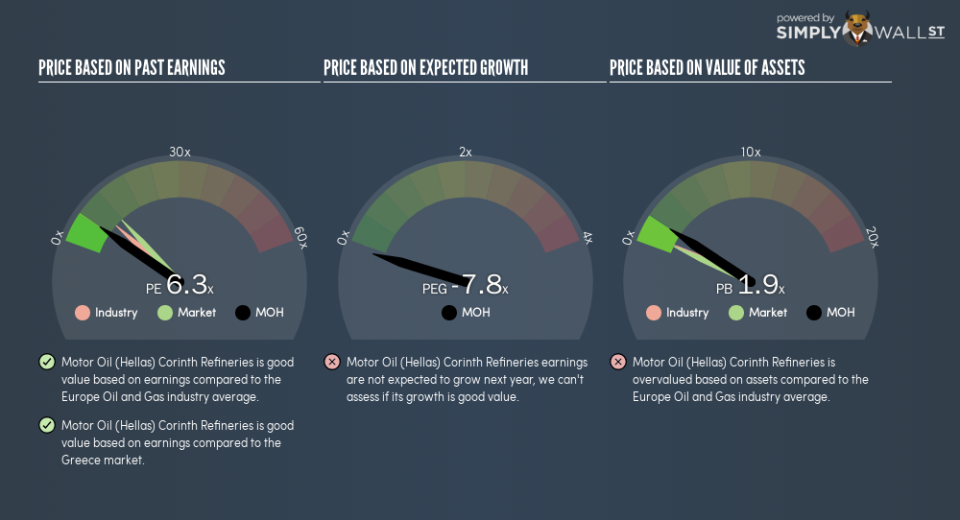Read This Before You Buy Motor Oil (Hellas) Corinth Refineries SA (ATH:MOH) Because Of Its P/E Ratio

This article is for investors who would like to improve their understanding of price to earnings ratios (P/E ratios). We’ll show how you can use Motor Oil (Hellas) Corinth Refineries SA’s (ATH:MOH) P/E ratio to inform your assessment of the investment opportunity. Based on the last twelve months, Motor Oil (Hellas) Corinth Refineries’s P/E ratio is 6.33. In other words, at today’s prices, investors are paying €6.33 for every €1 in prior year profit.
Check out our latest analysis for Motor Oil (Hellas) Corinth Refineries
How Do I Calculate A Price To Earnings Ratio?
The formula for price to earnings is:
Price to Earnings Ratio = Share Price ÷ Earnings per Share (EPS)
Or for Motor Oil (Hellas) Corinth Refineries:
P/E of 6.33 = €19.86 ÷ €3.14 (Based on the trailing twelve months to September 2018.)
Is A High Price-to-Earnings Ratio Good?
A higher P/E ratio implies that investors pay a higher price for the earning power of the business. That isn’t a good or a bad thing on its own, but a high P/E means that buyers have a higher opinion of the business’s prospects, relative to stocks with a lower P/E.
How Growth Rates Impact P/E Ratios
P/E ratios primarily reflect market expectations around earnings growth rates. That’s because companies that grow earnings per share quickly will rapidly increase the ‘E’ in the equation. That means even if the current P/E is high, it will reduce over time if the share price stays flat. A lower P/E should indicate the stock is cheap relative to others — and that may attract buyers.
Motor Oil (Hellas) Corinth Refineries saw earnings per share improve by -4.4% last year. And it has bolstered its earnings per share by 51% per year over the last five years.
How Does Motor Oil (Hellas) Corinth Refineries’s P/E Ratio Compare To Its Peers?
We can get an indication of market expectations by looking at the P/E ratio. We can see in the image below that the average P/E (9.2) for companies in the oil and gas industry is higher than Motor Oil (Hellas) Corinth Refineries’s P/E.
This suggests that market participants think Motor Oil (Hellas) Corinth Refineries will underperform other companies in its industry. While current expectations are low, the stock could be undervalued if the situation is better than the market assumes. If you consider the stock interesting, further research is recommended. For example, I often monitor director buying and selling.
Remember: P/E Ratios Don’t Consider The Balance Sheet
It’s important to note that the P/E ratio considers the market capitalization, not the enterprise value. That means it doesn’t take debt or cash into account. Theoretically, a business can improve its earnings (and produce a lower P/E in the future), by taking on debt (or spending its remaining cash).
Such expenditure might be good or bad, in the long term, but the point here is that the balance sheet is not reflected by this ratio.
Motor Oil (Hellas) Corinth Refineries’s Balance Sheet
Motor Oil (Hellas) Corinth Refineries has net debt worth 11% of its market capitalization. This could bring some additional risk, and reduce the number of investment options for management; worth remembering if you compare its P/E to businesses without debt.
The Bottom Line On Motor Oil (Hellas) Corinth Refineries’s P/E Ratio
Motor Oil (Hellas) Corinth Refineries has a P/E of 6.3. That’s below the average in the GR market, which is 11.6. EPS grew over the last twelve months, and debt levels are quite reasonable. If growth is sustainable over the long term, then the current P/E ratio may be a sign of good value.
Investors should be looking to buy stocks that the market is wrong about. If the reality for a company is not as bad as the P/E ratio indicates, then the share price should increase as the market realizes this. So this free visual report on analyst forecasts could hold they key to an excellent investment decision.
You might be able to find a better buy than Motor Oil (Hellas) Corinth Refineries. If you want a selection of possible winners, check out this free list of interesting companies that trade on a P/E below 20 (but have proven they can grow earnings).
To help readers see past the short term volatility of the financial market, we aim to bring you a long-term focused research analysis purely driven by fundamental data. Note that our analysis does not factor in the latest price-sensitive company announcements.
The author is an independent contributor and at the time of publication had no position in the stocks mentioned. For errors that warrant correction please contact the editor at editorial-team@simplywallst.com.

